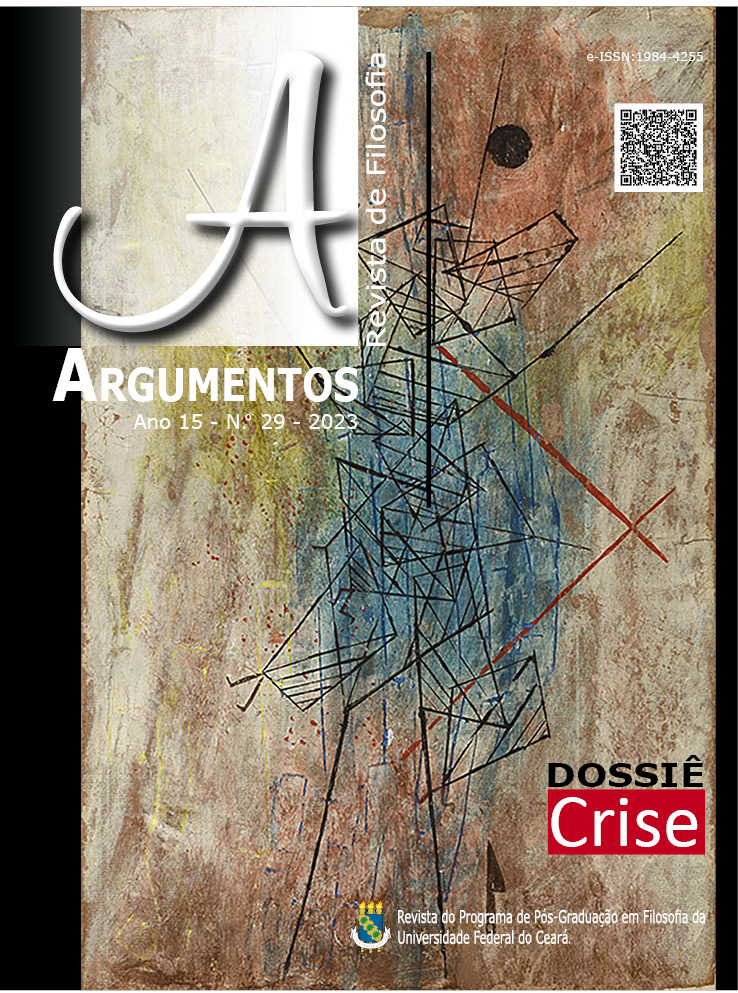On the inversion of the Ethos in our time, or axiological illusions
DOI:
https://doi.org/10.36517/Argumentos.29.14Keywords:
Crisis. Ethics. Values. Illusion. Affective perception.Abstract
Analisa-se a crise da ética a partir da discussão de questões centrais na fenomenologia de Scheler. Não se trata de recolocar o tema acima e recompor os seus argumentos enquanto elementos já presentes na ética material e fenomenológica do pensador, mas sim de pôr essa fenomenologia a serviço da elucidação e compreensão do sentido radical da crise. Nesse sentido, remete-se para a radicalidade da crise atual, considerando-a como um movimento histórico da modernidade, pelo qual se inverte, em base da estrutura vivencial do homem moderno, a hierarquia axiológica e deformam-se as relações originárias entre os valores, promovendo uma subversão do ethos. Para tanto, destacam-se as ilusões na percepção afetiva dos valores como sinais que reenviam para o núcleo do ethos vigente e sua atual dissolução.
References
HEIDEGGER, M. Introdução à metafísica. Rio de Janeiro: Tempo Brasileiro, 1999.
HEIDEGER, M. Sein und Zeit. 9ª edição. Tübingen: Max Niemeyer, 2016.
LEÃO, E. C. A crise da ética hoje em dia. In: LEÃO, E. C. Filosofia contemporânea. Teresópolis: Daimon, 2013.
NIETZSCHE, F. Götzen-Dämmerung. KSA 6. 2ª edição. München: de Gruyter, 1999.
RAMOS, D. R. Omnia habemus nihil possidentes. Percepção afetiva e valores na fenomenologia de Max Scheler. In: KAHLMEYER-MERTENS, R. S.; WEYH, K. M; KISSE, E. H S.; SILVA, M. R.; DIAS, J. (Orgs.). STUDIUM. Max Scheler: novas recepções. V. II. Vivens: Toledo, 2019. Disponível em: https://institutoquerosaber.org/acervovivens. Acesso em: 06.jul.2022.
SASSI, V. A ética em questão na pós-modernidade. Revista filosófica São Boaventura. Curitiba, v. 5, n. 1, jan./jun. 2012, p. 11-28.
SCHELER, M. Das Ressentiment im Aufbau der Moralen. In: SCHELER, M. Vom Umsturz der Werte. 6ª edição. Bonn: Bouvier, 2007a. p. 33-147.
SCHELER, M. Der Formalismus in der Ethik und die materiale Wertethik. 7ª edição. Bonn: Bouvier, 2000.
SCHELER, M. Die Idole der Selbsterkenntnis. In: SCHELER, M. Vom Umsturz der Werte. 6ª edição. Bonn: Bouvier, 2007b. p. 213-292.
SCHELER, M. Morte e sobrevivência. Lisboa: Edições 70, 2017.
SCHELER, M. Ordo amoris. Covilhã: Universidade da Beira Interior, 2012. Disponível em: http://www.lusosofia.net/textos/20120726-scheler_ordo_amoris.pdf. Acesso em: 06.jul.2002.
SCHELER, M. Ordo amoris. In: SCHELER, M. Schriften aus dem Nachlaß. 4ª edição. Bonn: Bouvier, 2000c. p. 345-376.
SCHELER, M. O ressentimento na construção das morais. In: Da reviravolta dos valores. 2ª edição. Bragança Paulista: São Francisco; Petrópolis: Vozes, 2012. p. 43-182.
SCHELER, M. Philosophische Weltanschauung. In: SCHELER, M. Späte Schriften. 3ª edição. Bonn: Bouvier, 2008. p. 73-182.
SCHELER, M. Tod und Fortleben. In: SCHELER, M. Schriften aus dem Nachlaß. 4ª edição. Bonn: Bouvier, 2000b. p. 9-64.
SCHELER, M. Visão filosófica do mundo. Perspectiva: São Paulo, 1986.
SCHELER, M. Wesen und Formen der Sympathie. 6ª edição. Bonn: Bouvier, 2009.
Downloads
Published
Issue
Section
License
Argumentos magazine is licensed under an International Creative Commons Attribution License.
The Magazine uses CC BY inclusion
1) The authors retain the copyright granted to the magazine or the right to initial publication, with the work regularly licensed under the Creative Commons Attribution, which allows the sharing of the work with acknowledgment of authorship and initial publication in this magazine.
2) The authors are authorized to contract additional applicable contracts, for non-exclusive distribution of the version of the work published in this journal (for example, publication in the institutional repository or as a chapter of the book), recognition of authorship and initial publication in this journal.
3) Authors are authorized and encourage to publish and distribute their work online (for example, in institutional repositories or on their personal pages) at any time before or during the editorial process, as they can generate productive changes, as well as increase the impact and reference of published work.




.jpg)










._._3.png)
1.jpg)
._._._.png)
